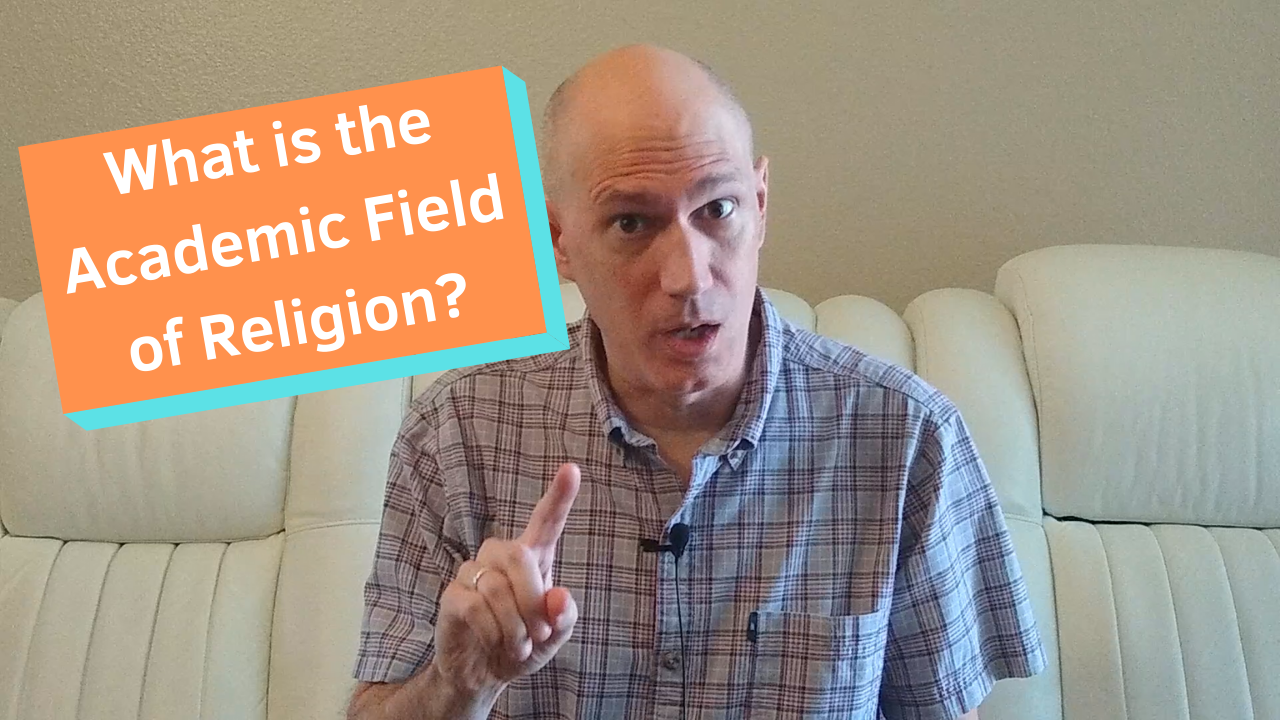06/10/2020 – What Is the Academic Field of Religion?

The academic field of religion, isn’t that, like boring? No dudes and dudettes, it’s way better than that! This is TenOnReligion.
What is religion?
Hey peeps, it’s Dr. B. with TenOnReligion. Today, we’re going to talk about the academic field of religion. It seems to mystify a lot of people because it’s different from being religious, or what’s called the devotional study of religion. Everyone’s general education should include some critical understanding about the ways in which religion shapes human behavior. This enables people to situate their own experiences and convictions with those of others in a broader historical and comparative context. Religion has had a huge influence on the histories and cultures of many regions of the world. A certain level of religious literacy is now indispensable in today’s globalized society in order to comprehend and understand the views of other people and cultures different from one’s own. In the U. S., introduction to the academic field of religion is usually an elective at the college level (unless one majors or minors in it). Put simply, the academic field of religion is a way for scholars to investigate religion from many angles. But before talking about the academic field of religion we have to first ask, what is religion? That’s actually both a simple and a complicated question.
Simple. Isn’t religion just the major world religions practiced by millions of people around the world? Religious traditions like Judaism, Christianity and Islam originating from the Middle East; or Jainism, Hinduism and Sikhism from India; or Daoism and Confucianism from China; or Buddhism originally from India but then spread across Asia and the world? Yes, it’s those, but it’s also more than just that.
It's complicated.
First, religious traditions have many sub-traditions and related traditions that people identify with. There are many ways to practice Judaism, many branches of Christianity, dozens of types of Islam, or perhaps a thousand ways Hinduism is practiced. There’s a lot of variety just within the so-called “major” world religions and the internal diversity within any given religion is substantial.
Second, there are many other religious traditions which do not necessarily directly relate to these major traditions. There are hundreds, if not thousands of indigenous traditions in every continent where humans have created long-lasting civilizations. In addition, there are many traditions which religious scholars call new religious movements – religious or religious-like traditions that have developed in the last century or so.
The bottom line is that religion is a very huge category. A category which religious scholars themselves struggle to agree on what types of human experiences and human practices qualify. So part of the academic field of religion is asking what the category of religion even includes.
Methods of investigation
There are also many ways that religious scholars explore religion as it is a multidisciplinary field of inquiry that uses a range of approaches. There are many methods of investigation. These include:
- History (texts and events of the past)
- Philosophy (epistemology, language, the existence and qualities of God)
- Aesthetics (art, music, creative writing, film)
- Cultural studies (feminism, gender, ethnicity)
- Social sciences (sociology, anthropology, archaeology, psychology, politics)
- and even the physical sciences (neuroscience, physics)
Each of these has its own set of methods of study and literature. These are just examples. The reality is much bigger. All of this is encompassed underneath the umbrella of Religious Studies as the most common name for this field of study. It’s similar to Asian in Asian Studies or Russian in Russian Studies. The word “Religious” refers to the object of the study and does not indicate that the person engaged in it is necessarily religious in the same way that the person researching Asian Studies or Russian Studies is not necessarily Asian or Russian.
So what do religious scholars do?
Most scholars have one or two main areas that they study, but also have other interests as well. They will often specialize in either a particular method, or a particular area like a religion or a geographical location, frequently coupled with a time period. Usually it’s both a method and a location, such as researching the history of medieval Judaism, 20th century gender in India, or the religious art of the Ming dynasty in China in the 1400’s and 1500’s.
For example, one of my main research areas has been interreligious hermeneutics – how a person from one religion interprets and understands a person from another religion. I mostly use history and philosophy but occasionally dabble with other methods like film study. There are many scholars who have quite a few ways to address this issue and I find it completely fascinating.
In their endeavors, religious scholars can be faith-based, interfaith, experiential, data focused or any combination of these.
Where are religious scholars?
Religious scholars exist at different levels and operate from a variety of institutions. Many are professional educators and researchers around the world. In the U.S., they exist at two-year institutions like community colleges, four-year institutions like small to medium liberal arts colleges, and large research universities. These institutions can be either public or private. Other scholars work at non-profit organizations, also either public or private. In addition, there are scholars who work at religious places of worship around the globe.
Some religious scholars work entirely within the framework of a particular religious tradition even to the point of rarely having contact or discussion with those outside of their own tradition. Other scholars regularly cross religious lines and are comfortable working with and researching in a number of different religions.
There is also the issue of personal religious commitment. Scholars are all over the map on this one. Some scholars are highly committed to one particular tradition and are often described as having an “insider” perspective. They often work with confessional or prescriptive material. Some may be committed personally but intentionally remain objective in their research. Others are nominally committed or not committed at all to any religious tradition and desire to have an entirely “outsider” perspective. Those with “outsider” perspectives often, but not always, work with descriptive or analytical material. Thus, there is a distinction between the devotional expression of religion, someone who is religious, and the researcher who studies devotional expressions.
In the U.S., the largest religious organization for all types of religious scholars is the American Academy of Religion. Another large scholarly organization is the Society of Biblical Literature. They have a joint annual meeting each fall in a different city and regional meetings throughout the year in different areas of the country. annual meeting draws scholars from all over North America as well as from other continents with literally thousands of people meeting over a 4-5 day period at a large convention center. Each year at this meeting there are hundreds of sessions, with dozens meeting simultaneously at different time slots from morning to night. In addition to the American Academy of Religion there are also many smaller organizations and educational institutions which have gatherings throughout the year, often based on a specific theme.
So that’s it. The academic field of religion is a vibrant community of people who love to learn and investigate human religious experiences. They come from a variety of backgrounds, study a variety of things, and use a variety of methods.
I hope this short introduction has helped you better understand this topic. Until next time, stay curious. If you enjoyed this, please like this video and subscribe to the channel. This is TenOnReligion.


